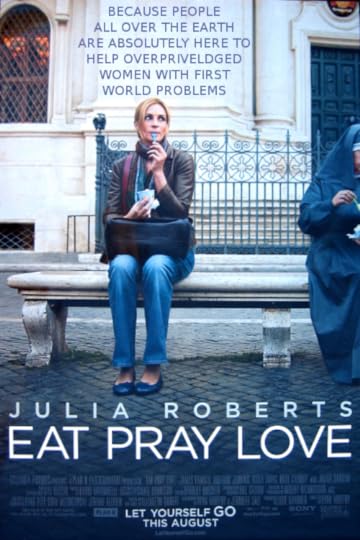What do you think?
Rate this book


368 pages, Paperback
First published February 16, 2006





I also knew somehow that this respite of peace would be temporary. I knew that I was not yet finished for good, that my anger, my sadness, and my shame would all creep back eventually, escaping my heart and occupying my head once more. I knew that I would have to keep dealing with these thoughts again and again until I slowly and determinedly changed my whole life. And that this would be difficult and exhausting to do. But my heart said to my mind in the dark silence of that beach: "I love you, I will never leave you, I will always take care of you." (p. 328)
She'd fallen in love with a Sardinian artist, who'd promised her another world of light and sun, but had left her, instead, with three children and no choice but to return to Venice and run the family restaurant. She is my age but looks even older than I do, and I can't imagine the kind of man who could do that to a woman so attractive. ("He was powerful," she says, "and I died of love in his shadow.) (p. 101)
Ketut went on to explain that the Balinese believe we are each accompanied at birth by four invisible brothers, who come into the world with us and protect us throughout our lives. When the child is in the womb, her four siblings are even there with her--they are represented by the placenta, the amniotic fluid, the umbilical cord, and the yellow waxy substance that protects an unborn baby's
skin...
The child is taught from the earliest consciousness that she has these four brothers with her in the world wherever she goes, and that they will always look after her. The brothers inhabit the four virtues a person needs in order to be safe and happy in life: intelligence, friendship, strength, and (I love this one) poetry. The brothers can be called upon in any critical situation for rescue and assistance. When you die, your four spirit brothers collect your soul and bring you to heaven. (p. 251)
Happiness is the consequence of personal effort. You fight for it, strive for it, insist upon it, and sometimes even travel around the world looking for it... And once you have achieved a state of happiness, you must never become lax about maintaining it, you must make a mighty effort to keep swimming upward into that happiness forever, to stay afloat on top of it. (p.206)
I think about the woman I have become lately, about the life that I am now living, and about how much I always wanted to be this person and live this life, liberated from the farce of pretending to be anyone other than myself. I think of everything I endured before getting here and wonder if it was me--I mean, this happy and balanced me, who is now dozing on the deck of this small Indonesian fishing boat--who pulled the other, younger, more confused and more struggling me forward during all those hard years... Knowing already that everything would be OK, that everyhing would eventually bring us together here. Right here, right to this moment. Where I was always waiting in peace and contentment, always waiting for her to arrive and join me. (pp. 329-330)
In the end, though, maybe we must all give up trying to pay back the people in this world who sustain our lives. In the end, maybe it's wiser to surrender before the miraculous scope of human generosity and to just keep saying thank you, forever and sincerely, for as long as we have voices. (p. 334)